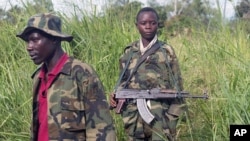Since 2003, tens of thousands of children have been removed from warring militias in the Democratic Republic of Congo. Boys and girls return from the bush traumatized, isolated, uneducated and too old to go back to school. United Nations statistics say thousands of armed children are still held by militias. And, many of those that escape, are abducted again by their commanders, or rejoin by choice.
Technically the war in Eastern Congo ended in 2003 with a peace treaty. Five years later, a power-sharing agreement was negotiated and it ended again. But, for children like 16-year-old Wetemwami, the fighting has never stopped.
After three years with the Mai Mai, a loosely connected group of militias still fighting in eastern Congo, Wetemwami is learning masonry at a vocational school for demobilized children. He cannot go to a regular school because, in his society, he is too old. But he hopes to learn a skill, so he can go home to his village and get a job.
But Wetemwami says life outside the military is hard in Congo, one of the world’s poorest countries. He says he wants to rejoin the Mai Mai, if it does not get easier. He says, as a soldier, at least he had a change of clothes.
The United Nations estimates that 3,500 boys and girls are serving in Congolese militias. But some observers say there are many more. When children escape the armed groups, many re-join or are taken back by force.
Some children return to militias because of extreme poverty. Others feel isolated when they get home because they are traumatized, uneducated and viewed as potentially dangerous. Some were forced to commit crimes in their own communities before they were taken, making them social pariahs.
Wetemwami says, if he does not rejoin by choice, he may also be caught by his commander, beaten and forced back into service.
Sixteen-year-old Kikandi says he never volunteered for the militia and will never go back by choice. In a classroom at the vocational school, he fiddles with a tiny hook, a tool meant to repair shoes.
He says about a year-and-a-half ago, soldiers stormed his village and demanded the young people. Parents who objected were beaten. He says his greatest fear is being taken away again.
Jennifer Melton is child protection specialist for The United Nations Children's Fund in Goma, a leading agency in the effort to get children out of the battles in Congo. She says UNICEF works to provide social services and supplies to villages whenever possible, encouraging demobilized children stay home. But she says re-recruitment is still common and appears to be happening with increasing frequency.
"I think the forced recruitment we are really grappling with, because we do not really have good ways of preventing that. If an armed group goes into a village at night or is calling youth together, we do not really have a grasp on how is the best way we can prevent that," Melton said.
Many children serve on the front lines, raiding villages and battling other militias for control of the population or a portion of the vast riches in minerals found in Congolese mines. Others are porters, spies, scouts, cooks or bodyguards.
Melton says girls are also forced to serve as soldiers and as sex slaves. She says girls have the worst time rejoining society, because when they get out, they are shunned. Everyone assumes they have been sexually assaulted. Usually, the assumption is right.
Since 2003, about 30,000 children have been demilitarized with the help of aid workers and growing pressure on commanders not to recruit minors. Pascal Badibanga Zagabe is the director of the Tumaini Center, the school where Wetemwami, Kikandi and other former child soldiers learn skills like carpentry, mechanics and sewing. He says mass demobilization has created a new set of problems.
With so many children returned from the wars and so few available resources even the children who do get access to aid, get only limited care. Last year, the Tumaini Center took on 150 students. Zagabe says the school had to turn down about that many.
Compared with his current situation, Wetemwami says life in the militia was not that bad. He says he was never afraid. Children smoked ganja and drank beer to keep them brave and wore powders and potions known as "Mai Mai magic"” He says, if a soldier uses the magic and adheres to the magical rules, bullets fly past him or ricochet off his body.
Wetemwami lifts his shirt to show four protruding parallel scars on his chest. He says bullets grazed him because he broke the rules, by stepping over the blood of the dead during a battle.
In his three years in the bush, 20 of his friends were killed and he killed 50 enemies. He says his friends died because they also did not follow the magical rules. Maybe they ate cucumber leaves or touched local plants during a raid. Maybe they raped a woman.
He shot his enemies because they would have shot him if he was not so quick.
Wetemwami says commanders told the troops they were fighting for the liberation of Congo. But he says they sometimes attacked villages already under their control, because they needed money, food or beer.
Kikandi says he rarely participated in raids. Soldiers would go to battle and he would hide in the bush.
He says when the soldiers returned, the boys that did not fight were beaten with sticks. But Kikandi says he was afraid to fight because, in his brigade, new recruits were not given magic to protect them. Kikandi says, in his one year as a soldier, he only killed one man. Like Wetemwami, he says he is just happy that he shot first.














